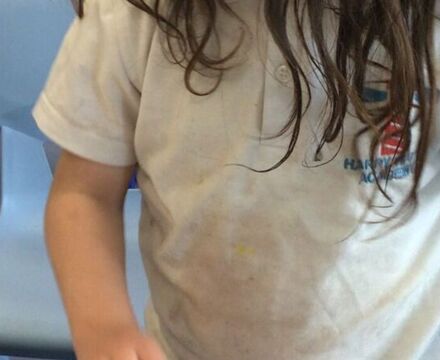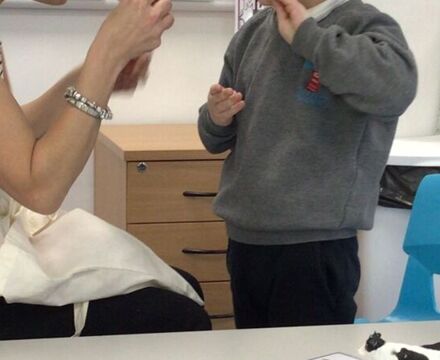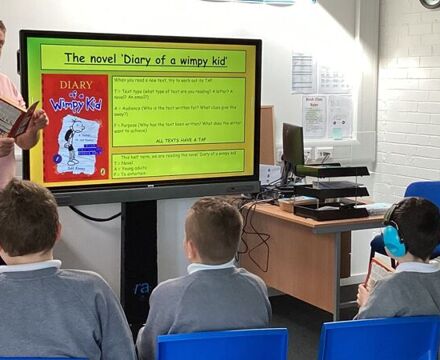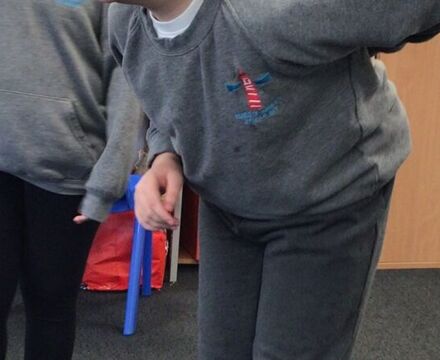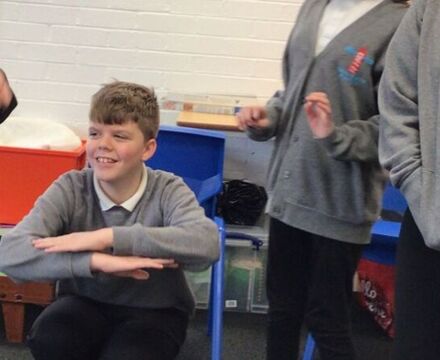- Home
- Curriculum
- Subjects
- English and Communication
English and Communication
Return to SubjectsEnglish and Communication Leads: Amber Nicholls (Engage), Karen Bowan(Explore) and Amanda Dunn (Discover)
Engage:
Pupils in the Engage Pathway have a large communication focus, which is embedded throughout our school day. We have specific Communication sessions based on our Speech and Language and EHCP Targets. This looks different in every class based on the individual pupils needs, but some Communication sessions may include Cookery, Turn Taking Games, Simon Says (to look at “doing words”), 1:1 Intensive Interaction and Attention Autism. As well as this, we learn early English skills through adult-led sensory stories, such as “Boom, Boom, Bang” which link directly to Topic for the half term. This links directly to Communication as we encourage symbol use and communication board to request and comment during our sensory story, whilst exploring a range of sensory story props to allow us to encounter the story. We have also begun to focus on some key words within our topics, such as astronaut and rocket, which we are regularly being exposed to throughout the topic and communication/English sessions.
The Engage Pathway also have specific Phonics sessions which are based on the pupils knowledge of phonics, such as exploring musical instruments or learning animal sounds as part of Phase 1, as well as accessing Time for Phonics. For the pupils who are on Phase 2, we follow the Rocket Phonics programme. Promoting the love of reading is also embedded within engage, through reading areas within the classroom, daily story-time and visits to our school library. In the Engage Pathway, we also have daily Clever Fingers sessions, which allow us to develop our fine motor skills through dough disco, mark making and early use and manipulation of tools such as pencils and scissors. We also embed communication, fine motor and early English within our child-led learning provision and outdoor learning, such as staff modelling key words and turn taking through play.
This will enable learners to progress within communication and become confident learners.
Explore:
Pupils within the Explore pathway will follow a specialised scheme of work based around stories, and a systematic, synthetic phonics programme. We have specific phonics lessons where the children will work on individualised and group activities. Love of reading is thoroughly promoted through library visits, staff-led story sessions and reading areas. Pupils within the Explore pathway are encouraged to develop their communication throughout all parts of the school day, including social times and through structured activities. Pupils are encouraged to develop their communication through the use of symbols and communication boards, this could be linked to an activity or a story. In the Explore pathway, pupils are encouraged to develop their fine motor skills across the curriculum. In English and Phonics lessons we encourage children to write with independence, promoting correct letter formation.
Discover:
Pupils on the Discover pathway are taught English in a more formalised way, following a curriculum which is predominantly derived from the Functional Skills aims with added National Curriculum aims where appropriate. This is to ensure that whilst pupils focus on the key skills to prepare them for post-16 education, employment or training, they are also exposed to a broad range of content to promote a love and enjoyment in English.
Teachers plan and deliver lessons focussing on skills involved in Reading, Writing, Speaking and Listening which are often linked to a text or theme and a SPAG session focussing on skills of spelling, punctuation and grammar. From Autumn 2, pupils are streamed based on ability for English which means the sessions are more tailored towards their needs and targets. There are also reading for pleasure lessons plans into the timetable to help promote a love of reading where students can pick a book of their choice to enjoy.
Pupils will participate in summative assessment throughout each year, and provided with opportunities for interventions to work on specific areas, such as reading, comprehension and phonics where required.
| Subject Documents |
|---|
| English Curriculum Map |
| English and Communication Intent, Implementation and Impact Statement |
